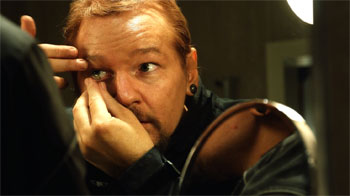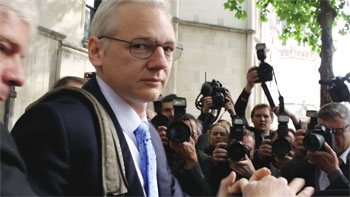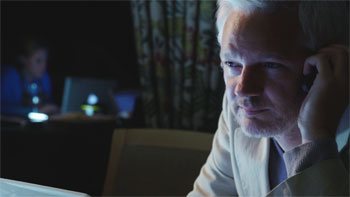Jacob Appelbaum Risk

Jacob Appelbaum Risk
Cast: Julian Assange, Sarah Harrison, Jacob Appelbaum
Director: Laura Poitras
Genre: Documentary
Rated: M
Running Time: 84 minutes
Synopsis: The Academy Award-winning director of CITIZENFOUR turns her camera on WikiLeaks publisher Julian Assange. Risk continues Laura Poitras' examination of voices who question authority in an era of ever-increasing surveillance and state secrecy. With unparalleled access, the film offers an intimate portrait of the cypherpunk underground: technologists, journalists and lawyers working to expose crimes at the highest levels and help activists worldwide to fight political oppression, in spite of considerable personal risks.
In 2011, WikiLeaks faces new challenges and a major official backlash following a string of sensational disclosures. WikiLeaks' work is now complicated by aggressive investigations by multiple U.S. security agencies that equate whistleblowing with treason. These are no empty threats, as Chelsea Manning's trial and eventual conviction make abundantly clear.
At the same time, editor-in-chief Julian Assange is appealing extradition to Sweden for questioning regarding allegations of sexual offences. Assange denies the allegations and no charges have been filed. Assange and his legal team believe that the Swedish case is a ploy with the ultimate goal of having him extradited to the United States, where they believe a sealed indictment under the Espionage Act awaits him.
Still, Assange and the staff continue to work, navigating the release of unredacted U.S. diplomatic cables by a third-party and publishing new leaks of surveillance industry technologies and Syrian government emails
When the U.K. courts deny his appeals against extradition to Sweden, Assange seeks asylum in the embassy of Ecuador in London. British police surround the embassy in a stand-off that remains in force to this day, four years later.
Unfolding in ten chapters, Risk is a behind-the-scene chronicle of events that revolutionized the operating procedure of journalism in its treatment of large datasets of leaked material. It is a group portrait of a generation of technologically capable young people willing to put themselves in danger in the interest of changing the system.
Risk
Release Date: June 15th, 2017
 Director's Statement
Director's Statement
I first approached WikiLeaks in 2010.They had just published the Apache helicopter video documenting U.S. soldiers gunning down Iraqi civilians, including two Reuters journalists. I began filming the organization in 2011, after the Arab Spring had begun and the U.S. government had launched a massive multi-agency investigation into Julian Assange and the staff. This secret investigation is still ongoing today, six years later.
Julian Assange is part of a generation who understood " both technologically and geopolitically " the power of the Internet to shift global power, giving citizens around the world the ability to impact global events, and giving governments the ability to amass power and monitor populations.
By enabling secure, anonymous leaking of large datasets, their publishing has changed the way journalism works. WikiLeaks' activities foreshadowed and enabled the emergence of whistleblowers like Chelsea Manning and Edward Snowden.
In a completely unexpected way, shooting the material that turned into Risk prepared me for what happened later when Edward Snowden contacted me. If you ever find yourself publishing large leaks of classified government material, it helps to have seen first-hand people navigate the technical, journalistic, and personal consequences.
Risk unfolds in ten chapters. The episodic structure is motivated by my love/hate relationship with narrative closure. While I understand the power of three-act structure and resolution, life doesn't unfold that way. It is only in retrospect that we create linear narratives to explain our choices. Life it much more uncertain and I wanted to capture the rush of the unknown and the unexpected.
WikiLeaks embodies a passionate calculus " we all make choices based on what we stand to gain, what we stand to lose and what the costs of a specific choice might be.
But WikiLeaks is one of those organizations that make the uncommon choice of taking the highest risks for potentially the greatest rewards. It is a gamble. You can crash and burn. But you can also change the world
 Dates
Dates
October 4, 2006: WikiLeaks is founded.
April 5, 2010: WikiLeaks publishes a 2007 U.S. military video as part of a film titled 'Collateral Murder," depicting U.S. soldiers shooting dead a dozen people in Baghdad, including a Reuters photographer and his assistant.
December 16, 2010: Because of a Swedish investigation into allegations of sexual offences, Assange is put on house arrest with a wearable electronic tracking device and curfew; by 10pm each night he must be inside his current place of residence.
May 11, 2011: The US government reportedly holds its first federal grand jury hearing to consider bringing criminal charges against Assange under the Espionage Act.
August 24-25, 2011: WikiLeaks releases nearly 134,000 redacted diplomatic cables – more than six times the total number previously published.
August 25, 2011: The German publication Der Freitag describes the existence of an encryption key and an encrypted folder containing unredacted WikiLeaks documents accessible in unnamed locations online. WikiLeaks contacts the U.S. State Department the same day. They are denied an in-person meeting with a U.S. diplomatic representative.
September 1, 2011: Wikileaks follows with its own publication of the unredacted archive.
November 2, 2011: The U.K. High Court dismisses Assange's appeal against extradition.
June 14, 2012: The U.K. Supreme Court dismisses Assange's appeal.
June 19, 2012: Assange seeks political asylum at Ecuadorian embassy in London.
July 5, 2012: Syria Files publication
June 23, 2013: Whistleblower Edward Snowden leaves Hong Kong for Moscow with WikiLeaks Investigations Editor Sarah Harrison. The U.S. government cancels Snowden's passport.
Summer 2013: With WikiLeaks help, Snowden applies for asylum in multiple countries.
August 21, 2013: Private Chelsea (previously Bradley) Manning is acquitted of 'aiding the enemy" but convicted of 20 other charges. She is sentenced to 35 years in prison.
February 5, 2016: The United Nations Working Group on Arbitrary Detention (WGAD) concludes its 16-month investigation and issues its decision, stating that Sweden and the United Kingdom are arbitrarily detaining Mr. Assange and the two countries must ensure his safety. He has not been outside the embassy for four years.
Summer 2016: The U.S. government multi-agency investigation into WikiLeaks and Julian Assange enters its sixth year. WikiLeaks continues to publish.
Risk
Release Date: June 15th, 2017
MORE
- Mission: Impossible Fallout
- Glenn Close The Wife
- Allison Chhorn Stanley's Mouth Interview
- Benicio Del Toro Sicario: Day of the Soldado
- Dame Judi Dench Tea With The Dames
- Sandra Bullock Ocean's 8
- Chris Pratt Jurassic World: Fallen Kingdom
- Claudia Sangiorgi Dalimore and Michelle Grace...
- Rachel McAdams Disobedience Interview
- Sebastián Lelio and Alessandro Nivola...
- Perri Cummings Trench Interview



